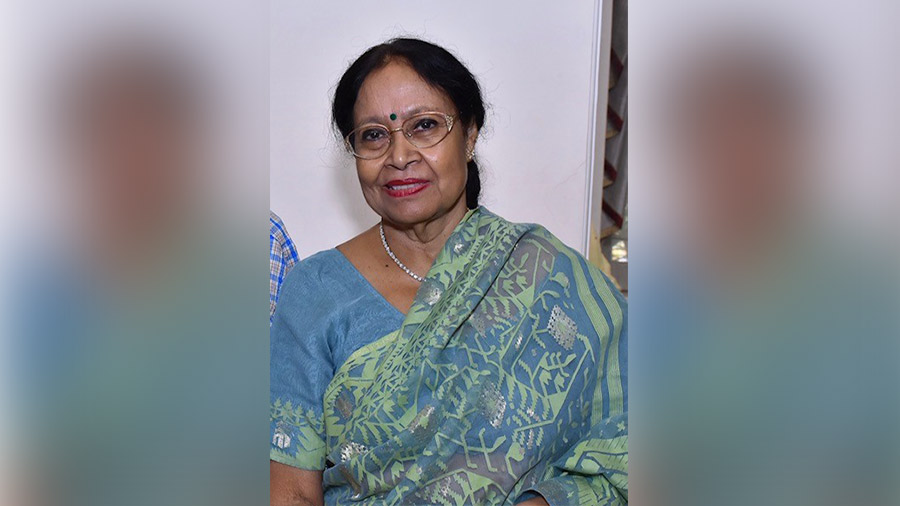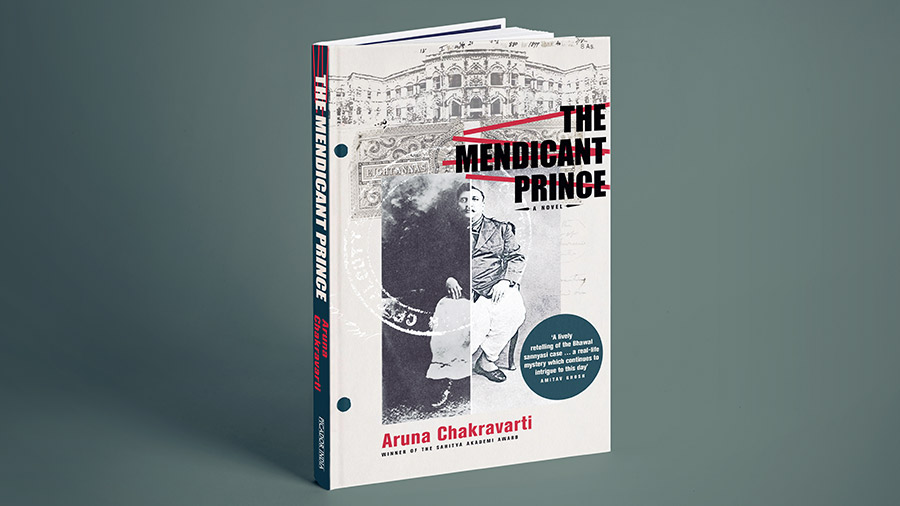Way back in 1909, the sky suddenly darkened in the afternoon and a fierce storm crashed through a cremation ground in Darjeeling where a prince’s body was being prepared for the pyre. What happened next culminated in the famous Bhawal Sannyasi case.
Sahitya Akademi Award winner Aruna Chakravarti’s latest novel The Mendicant Prince (Picador India) is based on this long-drawn legal battle that blurred people’s perception of what is real and what is not.
“A lively retelling of the Bhawal sannyasi case ... a real-life mystery which continues to intrigue to this day,” author Amitav Ghosh writes about the novel on its cover.
The book will be released on July 30.
My Kolkata shares an excerpt from the book:
The Sannyasi
January 1921
It was a raw, blustery morning in late January. A small knot of people could be seen standing near the Buckland Bund, an embankment on the Buriganga river. The river, which swirled and foamed along the edges of the city of Dhaka, was especially turbulent this winter.
All eyes were fixed on a man, a stranger to these parts. He had been sitting cross-legged on the Bund, gazing into the distance day and night, for the past three months, impervious to the cold gusts of wind and spray that rose from the agitated waters below. There was something odd about his appearance. He could be a Bengali, the locals surmised, judging by the shape of his face with its somewhat square jawline, wide nose and high cheekbones. His body was covered with ash but the patches that were visible were as fair as a European’s and his eyes, hooded by dark, heavy lids, a greenish brown. Masses of tawny hair fell in dreadlocks down his sturdy back and shoulders and a matted beard almost touched his navel. A tattoo — a word in some strange language — could be seen on his right arm. He was naked except for the strip of coarse orange cloth that covered his genitals. The men standing around stared at him with unabashed curiosity and exchanged glances. Once in a while someone would fling a question at him. They had been doing so from the first day they saw him sitting on the Bund.
‘Who are you? Why are you here?’ A middle-aged man in a silk lungi and woollen vest asked in a stern voice.
‘Main Bangla nahin jaanta.’ The stranger’s lower lip twisted to the right as he answered in Hindi.
A barrage of questions followed in a Hindi thickly accented with Bengali.
‘Where have you come from?’
‘Bahut door se.’ ‘
What are you doing here?’
‘Nothing. Just sitting.’
‘That we can see. But why here?’
‘No reason. I just … just came here …’
‘Are you a sannyasi?’
‘Yes. I’m a roaming sadhu.’
‘You look quite young. Must be in your mid-thirties. Am I right?’
The stranger shrugged his heavy shoulders and turned his eyes northwards on a massive structure looming in the distance. It was the zamindar’s mansion locally known as the Rajbari. The zamindars of Bhawal were rich and powerful beyond ordinary landowners and had been dignified by the title of Raja. Their sons were addressed as kumar, each according to his position in the hierarchy.
The man in the lungi moved aside. Another, an elderly gentleman in a dhuti and shawl, took his place.
‘You are too young to abandon the world. When did you become a sannyasi?’ The old man leaned forward and examined the stranger’s face and head closely. There was a puzzled look in his eyes.
‘I ran away from home in my youth and joined a group of holy men.’
‘How long ago was that?’
‘I don’t remember.’
‘Where did they take you?’
‘To the mountains. I spent many years there.’
The old man nodded. But the answer didn’t seem to satisfy him. The crowd ebbed, melted and swelled once more. Others took up the interrogation.
‘Do you have parents?’
‘No.’
‘Are you married?’
The man, calm and unruffled all this while, stiffened at this question. As though alerted to some hidden hostility. He had a prominent Adam’s apple which jumped up and down his throat.
‘Um …’ he hesitated, ‘yes … n-no. Yes. I had a wife … once.’
‘You left her too?
‘Yes.’
‘Why do you keep looking at the Rajbari?’
‘No reason.’ The answer came pat as though he had prepared for the question. ‘There’s nothing else to see …’

Author Aruna Chakravarti
The men walked away and stood a little apart. They exchanged meaningful looks and nudged and whispered. Snatches of their conversation came floating through the air.
‘Exactly like the mejo kumar. The same height and build. The same small hands and feet. Even the tiny wart on the lower lid of the right eye. What do you think, Taufique?’ The elderly gentleman turned to the man in the lungi.
‘Yes, indeed, Kashi kaka. I never did believe the story.’
‘You think anyone does?’
‘I don’t know about the family. The subjects certainly don’t. Not one.’
‘The man seems to be about thirty-five or thirty-six. Exactly the age the mejo kumar would have been today. Have you noticed the way he sits? Hunched forward like a bull.’
‘And his complexion! What man other than a royal could be that fair? His body is covered with ashes but I noticed his hands and feet.
Particularly the feet. Rough and scaly but shell pink. Like new milk with a drop of vermilion mixed in it.’
‘The colour of his eyes? And the tiny angles sticking out from the tops of his ears? The resemblance is uncanny. The mejo kumar too had …’
‘There are marks on his back and legs. And tiny patches on the scalp in between the dreadlocks. I looked at them closely …’
‘Yes, I noticed them too. The mejo kumar’s body was ridden with syphilis when he was sent to Darjeeling. These must be the scars.’
‘He seemed a bit rattled when I asked if he was married.’
‘He did indeed. He couldn’t decide what to say.’
‘He is the mejo kumar,’ a chorus of voices joined in. ‘The story we have been told is bunkum.’
‘Concocted by the mejo rani and her brother.’
‘Without a doubt. Without a doubt.’
‘Why do you think they did it?’
‘Who knows? They must have had their reasons.’
‘Mark my words, brothers,’ an old man wearing a skull cap observed darkly, ‘this man is pretending to be a sadhu, when he is in fact the mejo kumar – the second prince of the royal family. Now that both his brothers are dead, he is the sole heir of the estate. The real ruler. If I’m proved wrong, I’ll never venture another opinion as long as I live.’ He moved his head solemnly from side to side.
Excerpted with permission from the publisher.
(Buy the book here.)
